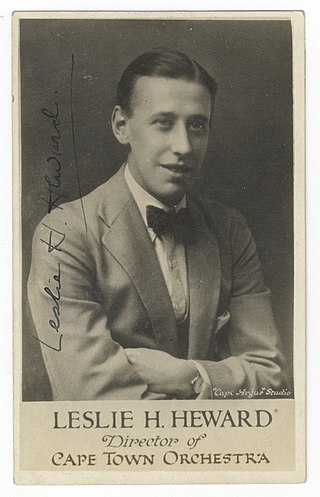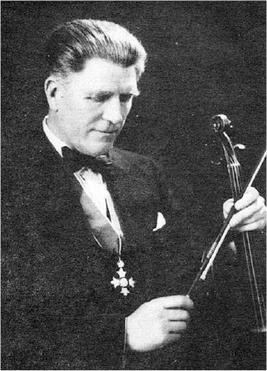Related Research Articles
Robert Wilfred Levick Simpson was an English composer, as well as a long-serving BBC producer and broadcaster.

Eugène-Auguste Ysaÿe was a Belgian virtuoso violinist, composer, and conductor. He was regarded as "The King of the Violin", or, as Nathan Milstein put it, the "tsar".

Josef Hassid was a Polish violinist.

Leslie Hays Heward was an English conductor and composer. Between 1930 and 1942 he was the Music Director of the City of Birmingham Orchestra.
The Quintet in A minor for Piano and String Quartet, Op. 84 is a chamber work by Edward Elgar.
John Douglas Louis Veale was an English classical composer.
Hugh Cecil Bean was an English violinist.

Albert Edward Sammons CBE was an English violinist, composer and later violin teacher. Almost self-taught on the violin, he had a wide repertoire as both chamber musician and soloist, although his reputation rests mainly on his association with British composers, especially Elgar. He made a number of recordings over 40 years, many of which have been re-issued on CD.
Erich Gruenberg was an Austrian-born British violinist and teacher. Following studies in Israel, he was a principal violinist of major orchestras, including the Royal Stockholm Philharmonic Orchestra, the London Symphony Orchestra and the Royal Philharmonic Orchestra. He was an international soloist, playing the first performance of Britten's Violin Concerto in Moscow. As a chamber musician, he was leader of the London String Quartet and recorded all Beethoven violin sonatas with pianist David Wilde. He was the lead violinist for The Beatles' album, Sgt. Pepper's Lonely Hearts Club Band. Gruenberg taught at the Royal Academy of Music until age 95, influencing generations of violinists.
The Stratton String Quartet was a British musical ensemble active during the 1930s and 1940s. They were specially associated with the performance of British music, of which they gave numerous premieres, and were a prominent feature in the wartime calendar of concerts at the National Gallery. After the War the group was re-founded as the Aeolian Quartet.

Arthur Catterall was an English concert violinist, orchestral leader and conductor, one of the best-known English classical violinists of the first half of the twentieth century.
Jean Pougnet was a Mauritian-born concert violinist and orchestra leader, of British nationality, who was highly regarded in both the lighter and more serious classical repertoire during the first half of the twentieth century. He was leader of the London Philharmonic Orchestra from 1942 to 1945.
William Henry Reed MVO was an English violinist, teacher, composer, conductor and biographer of Sir Edward Elgar. He was leader of the London Symphony Orchestra for 23 years (1912–1935), but is best known for his long personal friendship with Elgar (1910–1934) and his book Elgar As I Knew Him (1936), in which he goes into great detail about the genesis of the Violin Concerto in B minor.
Eda Kersey was a British violinist renowned for her brilliant playing. She premiered a number of important works, including the Bax Violin Concerto, but her career was cut short by her early death.
Trevor James Williams was a British violinist and professor at the Royal Academy of Music and at North Carolina University.
Nona Patricia Liddell MBE was a British violinist. She was a soloist, leader of chamber music ensembles, and a teacher. For many years she was leader of the London Sinfonietta.
Bernard Shore was an English viola player and author.
Stanley Herbert Wilson was a British composer and music teacher.
Arthur Leavins was a British violinist. He was concertmaster of the Royal Philharmonic Orchestra for most of the 1950s under conductor Sir Thomas Beecham; after which he played with the BBC Symphony Orchestra and served as concertmaster of the BBC Concert Orchestra for 17 years. A child prodigy, he began his performance career as the age of 4 in New Zealand and by the age of 14 was a violinist with the Leicester Symphony Orchestra. He studied with Arthur Catterall at the Royal Academy of Music, and became a member of Catterall's string quartet after earning his diploma. He was married to pianist Mary Baddeley whom he met while playing with the City of Birmingham Symphony Orchestra during the 1940s. They had two sons. As a soloist, he was particularly admired for his performances of Edward Elgar's Violin Concerto.
Harry Danks, (1912-2001) was a British violist and principal viola of the BBC Symphony Orchestra from 1946 to 1978. He was the founder and director of the London Consort of Viols.
References
- ↑ [ dead link ]
- ↑ "BBC Radio 3". tumblr.com.
- ↑ "Search Results – BBC Genome". BBC. Retrieved 9 July 2015.
- ↑ "Artur Schnabel: Brahms's chamber music with Szigeti and Fournier". Arbiterrecords.org. 6 February 2000. Retrieved 9 July 2015.
- ↑ "BBC Proms – Events". BBC Music Events. Retrieved 9 July 2015.
- ↑ Griffiths, Paul. "Avant Garde." (1979): 838–840
- ↑ "Friends of the Musicians' Chapel". Musicianschapel.org.uk. Retrieved 9 July 2015.
- ↑ The Guardian, Newspaper Obituary, 12 November 1990
- ↑ The Power of Robert Simpson – A biography – ISBN 978-1-4797-9438-6